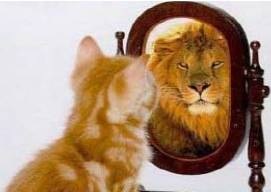
When you look at yourself in the mirror, do you see yourself or an image of who you think you are?
I wonder about this many times. Whenever I see myself on video or hear my interviews on the radio, I sound so strange. Everyone around is certain that the 2-dimensional person on the screen is exactly the same as the person standing next to them, but I am not 100% convinced. Surprise, surprise, but what we think about ourselves and what others think about us are so different that sometimes it feels as if we are not talking about the same person.
What we think about ourselves is what we call our “Self Concept”. If you want to discover yours, simply ask yourself: Who am I?
This seemingly simple question is big, really big. Of course, your answers may be different, but most people include: social roles, physical appearance, health, relationships, location, achievements and skills.
How do we form this self concept?
Researchers believe that we do not have it at birth, but soon after, we start recognising there are other things but “us”. At the age of six or seven months, babies can recognise their “self”. At that stage, the self concept is only physical “this hand is me” or “this leg is me” and only later we discover other parts of our identity.
One theory about the formation of the self concept (Rosenberg) describes it as a product of the messages we receive throughout our lives. If you ask people what shaped their identity and made them who they are, they will recall the big events in their life, while in fact the subconscious mind records many more events that we consider insignificant but their accumulation forms our identity. Contrary to what people believe, our self concept is shaped by many tiny events.
As much as we do not like to admit it, every person’s self concept is shaped by those around them. If you have received messages of appreciation, you are likely to appreciate yourself. If you have received massages of criticism, you are likely to feel less valuable, loveable and capable.

Our family is the first place where we received such messages. Our parents are a great source of input for our self concept, due to the importance they have in our life. Statistically, parents with healthy self concepts raise kids with healthy self concepts. When there is a gap between the parents’ self concepts, (lucky us) kids will most likely choose the more positive parent model. If neither of the parents have a strong positive identity, the child will seek out an adult outside the family for a role model.
If you want to discover your self concept, try these things:
- Ask yourself “Who am I?” Write your answers on a peace of paper. Many people start with their name. Yes, I know, not everyone likes writing, but you need that list later and please be brutally honest.
- Think of someone in your life who helped you feel accepted, worthwhile, important, appreciated or loved. After bringing this person from your memory, find someone who acted in a way that diminishes your self esteem. What you think of yourself is an accumulation of such messages. Did you receive more positive or more negative messages?
- Go over your identity list and find out where you got each item from? Who is the person that “gave” you that part of your identity?
- Think of all the people around you – family members, friends, work colleagues and neighbours – and find out which part of your self concept they support, the positive one or the negative one.
- Think of your parents. Who sent positive messages? Who did the opposite and ask yourself “Which one of them influence my life most?”
Try this exercise and share your discoveries with me.
Next week, we will cover what kind of messages mean more to us than others and why, so stay tuned! You can subscribe via RSS or Email and the posts will be sent straight into you.
Until next time – love the person in the mirror!
Ronit











